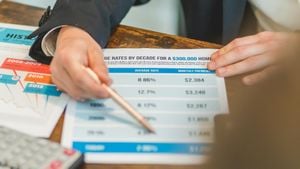Arizona's Economic Climate Shapes Presidential Election Hopes
With the presidential election looming on November 5, the economic climate is stirring up significant conversations among Arizona voters. Reported by the Associated Press, the state’s economy is exhibiting strong growth indicators yet many residents feel disconnected from this supposed prosperity.
Maricopa County, which houses cities like Phoenix, Mesa, and Chandler, is seeing a surge fueled by the allure of its warm climate, economic opportunities, and relocation of tech giants such as TSMC and Google. Despite the flourishing job market, the stark reality is the soaring cost of living—particularly real estate—that leaves many voters anxious for tangible improvements.
According to the Labor Department, Maricopa County recorded the highest job gains nationally this year. Yet, home prices have nearly doubled since 2016, making homeownership seem like a distant dream for many younger Arizonians. Glenn Farley, director of policy and research at the non-profit Common Sense Institute Arizona, captured the frustration succinctly, stating, “Many voters see home prices and 30-year mortgage rates and compare it to the experience of their parents and grandparents and say, ‘I’m never going to own a home.’" This vivid disconnect underlines their skepticism toward the promises of economic growth made by candidates Kamala Harris and Donald Trump.
While both parties aim to win over the middle class, many Arizona voters feel they have heard such promises before—only to be left disappointed. The increasing costs of housing, groceries, and other essentials sparked complaints across party lines. Vice President Harris proposed initiatives aimed at first-time homebuyers, emphasizing tax breaks for new parents and promising support for the middle class. On the other hand, Trump’s campaign argues mass deportations of undocumented migrants would ease housing shortages, and aggressive tariffs would bring back job opportunities.
Nevertheless, the shadow of post-pandemic inflation looms large, leaving many voters feeling alienated. For residents like Abel Ramirez, 32, who is struggling to find suitable housing for his growing family, the primary concern is the daily struggles rather than the candidates' side discussions. Ramirez, who previously supported Trump, is now contemplating abstaining from this voting process.
Interestingly, personal views on the economy reveal some dichotomy among Arizonians. A recent poll highlighted nearly 60% of participants viewed their personal economic situation as “good,” whereas 70% expressed discontent with national directions. This contradictory sentiment reflects the complex layers of the perceived economic health versus lived experiences.
John Akers, aged 34, expresses his mixed feelings—he and his wife are financially stable due to their thriving business but see others around them grappling with rising living expenses. “No matter what, we’re going to have polarization at the end of this election,” he mentioned, indicating the growing divide among citizens based on economic conditions.
Such contrasting views on the economy are not only shaping individual voting decisions; they are also prompting big-name figures to step onto the political stage. Billionaire entrepreneur Mark Cuban, for example, publicly voiced support for Harris during his town hall meeting with small-business owners. He claims, "Under Kamala Harris, small-business owners can make more money than they would under Donald Trump." Cuban hammered down on the point about tariffs, labeling Trump's approach as detrimental to retailers: “Donald Trump is the Grinch that's trying to steal your Christmas.”
Cuban's sweeping endorsement connects with voters as he positions himself as someone who understands the struggles of everyday people, contrasting sharply with Trump’s reputation as the privileged businessman. Cuban's comments echo sentiments shared by other political leaders, such as Barack Obama, who critiqued Trump’s approach to small business during recent campaign stops.
On the campaign trail, both parties are making substantial efforts to connect with voters on economic issues, yet skepticism runs deep among constituents who demand concrete policy proposals rather than rhetorical flare. Each candidate’s grasp of local issues and responsiveness to the economic demands of their constituents could be pivotal as they pitch their campaigns leading up to the election date.
Coupled with the upcoming voting date, Arizona emerges as one of the significant battlegrounds where economic talking points can swing seen electoral preferences. The economic narrative, filled with hope yet cast under clouds of doubt about actual change, will continue to shape voters' outlook as they prepare to make decisive choices for the future.



